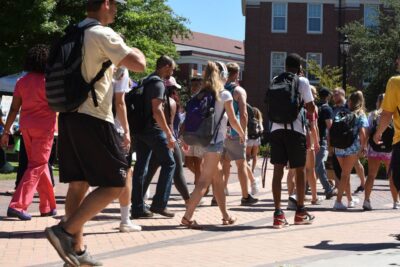Growing undergraduate online enrollment
By Michael Harrington, AVP, Strategic Enrollment Services, Drexel University
The views and opinions expressed are those of the author and do not necessarily represent the views or opinions of EAB.
Many institutions are well underway in developing strategies to address anticipated challenges to enrollment related to a shrinking number of high school graduates expected in the years ahead. At Drexel University, we have spent considerable time and effort reflecting and acting to preemptively address this challenge. Emerging from this effort has been the goal of increasing adult learner enrollments, specifically in the undergraduate online space.
Drexel has long had a presence in online education, first delving into the space in the 90s and building toward our current state of offering over 150 degrees and certificates. Unlike the broader market, Drexel’s portfolio is heavily tilted toward the graduate space, with only a little over 10 degrees and certificates offered at the undergraduate level.
With assistance from EAB, market research was performed that helped us identify unrecognized potential in this space, and a path forward was charted within our strategic planning process to help grow our presence. Those efforts have been centered around the goals of increasing the competitiveness of our existing degrees, improving support to align with the unique needs of the adult learner, and lastly developing new market-friendly programs, which was the focus of my capstone project in the Rising Higher Education Leaders Fellowship.
An experience I had over the fall served as inspiration for placing the focus of my capstone on the development of new undergraduate online programs at our institution. There was interest from one of our academic units in developing an online version of an existing degree offered exclusively on-campus. Research suggested an online version of the program had strong market potential.
As we began the process of evaluating how to proceed, we were halted in our tracks by one major roadblock: substantial course requirements for the existing degree were not being offered online. These courses were largely offered via another college at Drexel thereby compounding the challenge. We quickly realized there wasn’t a clearly defined process to guide the relevant parties further down the pathway of resolution and implementation.
To begin addressing this challenge, a workgroup was formed to further our goal of increasing presence in this space. Our group plans to perform an initial discovery of existing on-campus degrees to perform a gap analysis, develop a framework of support to guide this process from start to finish, and provide formal recommendations on what infrastructure improvements are needed to create optimal conditions for new program development in the undergraduate online space.
Participating in the EAB Rising Higher Education Leaders Fellowship was a valuable experience that shaped new perspectives, helped form connections, and inspired reflection on the work that I perform at my university. I am grateful for the opportunity to learn and grow from the knowledge shared by other members of this fellowship cohort and EAB.
More Blogs

Five trends that give community colleges a surprising edge in 2026

Is your yield rate okay?
